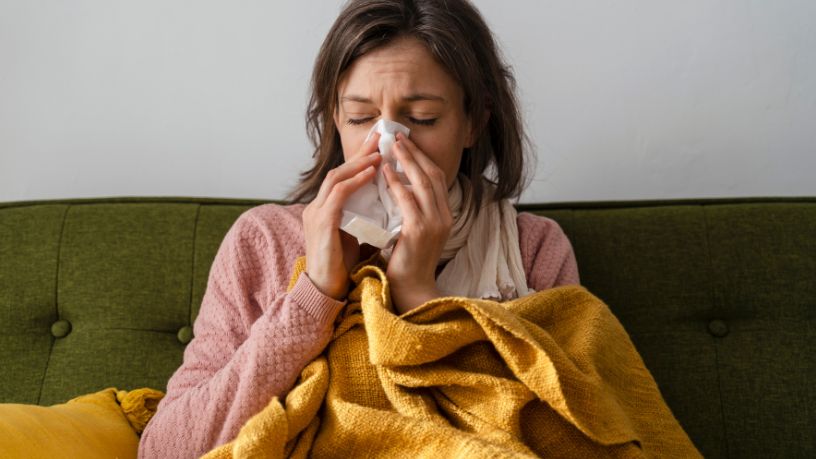The flu is more serious than a common cold and can be dangerous for some people.
On this page
Key takeaways
Practising good hygiene can help lower your risk of getting the flu.
Talk to your GP or local pharmacist about how to get your annual flu vaccination.
It's that time of year when the cold weather kicks in and the tissues come out.
With winter comes the peak of flu season. Flu is highly contagious, but there are things you can do to help protect yourself.
We break down what the flu is, the common symptoms and how you can reduce your risk.
What is the flu?
The flu (or influenza) is a highly contagious virus which affects your respiratory tract (your nose, throat, and sometimes your lungs). There are 2 main types of influenza: type A and type B. Most people are infected with type A, although there are many different strains.1
The flu is more serious than a common cold and can cause debilitating symptoms in some people. While most cases don't lead to other health complications, the flu is linked to more than 3,000 deaths and around 18,000 hospitalisations in Australia every year.2
How can you catch the flu?
Flu viruses mainly spread when someone with the flu sneezes, coughs or talks, and droplets containing the virus spread into the air. If you breathe these droplets in, you might get infected.1
You can also pick up the flu by touching infected surfaces such as hands, door handles and other shared surfaces, and then touching your nose or mouth. That's why you're more likely to catch the flu in crowded spaces, like on public transport.
What are the symptoms of flu?
Common signs you may have the flu include:1
- a blocked or runny nose
- sneezing
- sore throat
- cough
- high temperature
- aching muscles and/or chills
- headache.
Fatigue is also a symptom and can last for weeks after other symptoms have gone. Less common symptoms include loss of appetite, vomiting and diarrhoea.
[Dr Simon Benson stands in a doctor's office with an empty exam bed behind him.]
Dr Simon Benson: Hi, I'm Dr Simon Benson from Bupa.
At this time of year, there's lots of viruses around, and one of those is called influenza, which we commonly call 'the flu'.
For some people, the flu is really serious and can even land you up in hospital or worse.
There's lots of things that you can do to protect yourself from the flu.
People with chronic conditions like heart disease, asthma, lung disease, diabetes are a higher risk of having a worse outcome.
So it's really important that you think about protecting yourself and your loved ones, and the best way to do that is with a vaccination.
The flu jab is available in Australia now.
You can get it from your doctor, from your local chemist, and in some cases it's funded.
As always, if you're unwell or you're worried about your symptoms, reach out and talk to your doctor.
Is the flu serious?
The flu is more than a bad cold. While most healthy adults will recover within a week or so, certain groups are more likely to develop complications (like pneumonia or an infection of the ear, nose or throat), which can lead to serious health issues or even death. These groups include:1
- people aged 65 and older
- babies and children aged under 5
- pregnant people
- Aboriginal and Torres Strait Islander people
- people with lowered immunity or other health issues.
Children under the age of 6 can sometimes have seizures or fits (known as febrile convulsions) because of the high body temperature caused by the body's reaction to the virus.3
How long does the flu last?
You might experience symptoms of the flu for just a few days or over a week, but you can be infectious before symptoms appear and remain infectious for 10 days or more from the start of your illness.5
Rest, fluids and over-the-counter cold and flu medication (such as paracetamol and ibuprofen) can help to ease symptoms and aid recovery. See your GP if you're concerned about your symptoms, have a high fever, a cough that's not improving or are in a high-risk group (listed above).1
Get chemist delivery
Bupa health insurance members can have prescriptions filled by local chemists and get them delivered to their door by registered couriers. You can also order over-the-counter goods. Delivery address must be within 8km of a participating pharmacy.
How can I avoid the flu?
Good hygiene and healthy habits can lower your chances of getting the flu. Try to:1
- wash your hands frequently and thoroughly
- avoid touching your face, eyes and mouth
- keep shared items and surfaces clean (like phones, desks, keyboards, cups)
- use hand sanitiser when you can’t wash your hands (such as when using public transport)
- exercise regularly (as little as 30 minutes of brisk walking every day can help reduce stress levels and boost your infection-fighting ability)
- stop smoking and avoid second-hand smoke
- eat a healthy, balanced diet
- get enough sleep.
If someone you spend a lot of time with has the flu, encourage them to wear a mask, wash their hands often, and avoid sneezing and coughing around others to reduce the risk of passing it on. Be sure to keep common areas at home and work well ventilated, and get outside for fresh air as much as you can.
If you have the flu, stay home until symptoms have gone to help prevent spreading the virus.
Will a flu vaccination stop me getting the flu?
Health experts recommend getting a flu vaccination every year.1 It reduces your chance of getting the flu and reduces the risk of serious illness if you do get it.6 Since flu viruses change and new strains can frequently appear, the flu vaccine formulation is reviewed and revised annually.
While some people report feeling a little under the weather after a flu jab, you can't get a flu infection from it as the virus isn't live.
It takes around 2 weeks for your body to develop immunity once you've been vaccinated, which usually lasts for 9 to 12 months. You should get your flu jab in April or May for maximum protection through peak flu season (from July to September in Australia).
Pregnancy, breastfeeding, and the flu
It's recommended people who are pregnant or planning a pregnancy have the flu vaccine. Catching the flu during pregnancy can increase your risk of complications and could affect the outcome of your pregnancy.4
Studies have consistently shown that having the flu vaccine during all stages of pregnancy is safe. It is also safe to get vaccinated if you're breastfeeding. The immunisation can help provide ongoing protection to newborn babies for the first 6 months after birth.
Talk to your GP about any concerns you have around the flu and how to get a vaccination.

At Bupa, trust is everything
Our health and wellbeing information is regularly reviewed and maintained by a team of healthcare experts, to ensure its relevancy and accuracy. Everyone's health journey is unique and health outcomes vary from person to person.
This content is not a replacement for personalised and specific medical, healthcare, or other professional advice. If you have concerns about your health, see your doctor or other health professional.
1Healthdirect. (2024). Flu (influenza). Australian Government.
2Hudson Institute of Medical Research. (2025). Influenza. Hudson Institute of Medical Research.
3Better Health Channel. (2021). Fever - febrile convulsions. Victoria State Government, Department of Health.
4NSW Health. (2024). Influenza information for pregnant women. NSW Government.
5NSW Health. (2024). Influenza fact sheet. NSW Government.
6Australian Government, Department of Health and Aged Care. (2025). Your questions answered. Australian Government.
You might also like...
Why get the flu shot?
Your annual flu jab can help reduce your risk of catching the virus and lower the severity of your symptoms if you do get it. Find out how it works.
The difference between a common cold and the flu
Colds and the flu can share a lot of the same symptoms, so we asked Dr Janice Tan how you can tell the difference and what you can do to reduce your risk.
The best flu treatments and remedies for winter
Flu symptoms can be debilitating, but an annual vaccination, certain medications and some tried and tested home remedies can help you get better faster.
Can the flu lead to pneumonia?
A bad case of flu can lead to complications, and one of the most concerning is pneumonia. Find out what pneumonia is, the symptoms, and how it’s treated.





